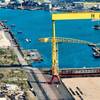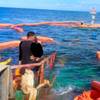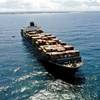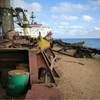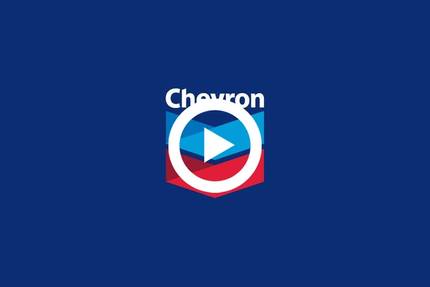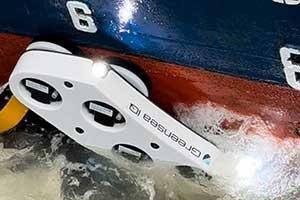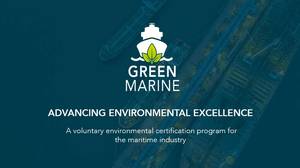Two Coast Guard small boats set a security zone around the 900-foot container ship Cosco Busan. The ship hit the San Francisco Bay Bridge Nov. 7, 2007 spilling an estimated 58,000 gallons of oil into the bay.(U.S. Coast Guard photo by Petty Officer 3rd Class Melissa Hauck)
City Attorney Dennis Herrera filed suit in San Francisco Superior Court, under the State's Lempert-Keene-Seastrand Oil Spill Prevention and Response Act and other state laws, against the parties responsible for the November 7 oil spill incident in the San Francisco Bay. In that incident, the M/V Cosco Busan, a 65,131-ton, 900-ft. long container ship, unsuccessfully navigated a passage beneath the San Francisco-Oakland Bay Bridge, and upon striking the base of the bridge's Delta Tower and ripping a gash in the ship's hull, caused a toxic oil spill of 58,000 gallons of heavy bunker fuel into the waters of the San Francisco Bay. The extent of the damage caused by the spill and the economic ramifications for the City and County of San Francisco are yet unknown, but the damages will potentially total millions of dollars. The suit seeks compensation on behalf of San Francisco for all costs associated with the response and investigation of the incident and requests injunctive relief requiring defendants to implement a plan to assess, monitor and remediate all damages caused by the catastrophic event. The suit also seeks civil penalties on behalf of the people of the State of California for defendants' violations of state laws designed to protect the delicate marine environment of the San Francisco Bay. The defendants named in Herrera's lawsuit are Regal Stone, Ltd., Fleet Management, Ltd., Hanjin Shipping Co., Ltd, Synergy Management Services Ltd., Synergy Marine Ltd., and San Francisco Bar Pilot John J. Cota.
The spill has so far killed and injured at least 2,200 birds, as well as marine mammals, fish and other sea animals that sustain the Bay's ecosystem, and has caused significant damage to San Francisco's bay front properties. The spill has also adversely affected the livelihoods of hundreds of career fishermen who depend on healthy waters in order to fish for crab and other marine species. Additionally, due to the need for immediate response to the disaster, San Francisco and other Bay Area cities and their residents have been unfairly burdened by the City's expending their tax dollars-potentially totaling into the millions-for costs relating to the clean up and monitoring of the jeopardized waters and the adjacent coastlines.
"This was a wholly avoidable incident that has caused more injury to the San Francisco Bay Area than we can yet begin to fathom," said Herrera. "It is sad to say that there has been a grave amount of damage that has occurred because of this catastrophe, imposing an unjust and heavy burden on the residents of San Francisco and other cities and counties in the Bay Area. In filing our case against the parties responsible for this incident, we can start to recoup the monetary costs and resource damage that this disaster has imposed and begin the healing process for the waters of the Bay and its surrounding areas."
Herrera, a former maritime attorney, and appointee to the U.S. Maritime Administration in Washington, D.C., during President Clinton's Administration, alleges in his lawsuit that at 8:30 a.m. on November, 7, 2007, in violation of safe operating regulations prohibiting vessels from sailing in dangerously foggy conditions, John J. Cota, the pilot of the Cosco Busan, negligently attempted to make the routine passage from the Port of Oakland toward the open sea beyond the Golden Gate Bridge on its voyage to South Korea. While navigating the ship through two bases of the San Francisco-Oakland Bay Bridge set at a distance of 2,200 feet apart, Mr. Cota failed to clear one of the towers and collided with it causing a gash in the hull of the ship, allowing the bunker fuel to gush into the waters of the Bay. As a result of the incident, numerous San Francisco beaches, including Baker Beach, China Beach and Crissy Field, were deemed unsafe because of the toxic fuel and San Francisco residents and visitors were subsequently unable to visit and enjoy these public recreational areas. Waters within and around the Bay were closed and crabbing and fishing restricted during a season that is traditionally marked as one of the most profitable times of the year.
The City alleges that parties responsible for the spill were negligent in operating the Cosco Busan, by neglecting to follow normal procedures that would have prevented the incident. By attempting to sail the ship in the Bay in foggy conditions; proceeding on a course in the Bay with insufficient information about the level of visibility; proceeding at a speed that was excessive for the circumstances; not using the available resources to ensure safety and minimize the risk of accident, including a tugboat, the Vessel Traffic Service of the Coast Guard, and the ship's lookout; and failing to be fully acquainted with and able to operate the ship's navigation system, the owners and operators of the ship put San Francisco in grave danger.
The suit additionally alleges that after the collision, ship owners and operators violated the Lempert-Keene-Seastrand Oil Spill Prevention and Response Act, under which they are absolutely liable, by failing to respond appropriately to the spill. Defendants are subject to civil penalties of between $25,000 and $500,000 for each day in which a violation occurred. The City will additionally seek compensation for the taxpayer dollars spent in managing the clean-up effort in the days following the spill, including response activities; committing the time and labor of city employees to clean up and assess damage to property; and recruiting, training and supervising volunteers to perform cleanup efforts to save natural resources, including beaches and wildlife.
The case is CCSF vs.Regal Stone, Ltd; Fleet Management Ltd; Hanjin Shipping Co., Ltd; Synergy Management Services; Synergy Marine Limited; John J. Cota, an individual, and Does One Through 100.
Sponsored Content
Lower carbon intensity solutions from pit to port

Subscribe for
Maritime Reporter E-News
Maritime Reporter E-News is the maritime industry's largest circulation and most authoritative ENews Service, delivered to your Email five times per week



